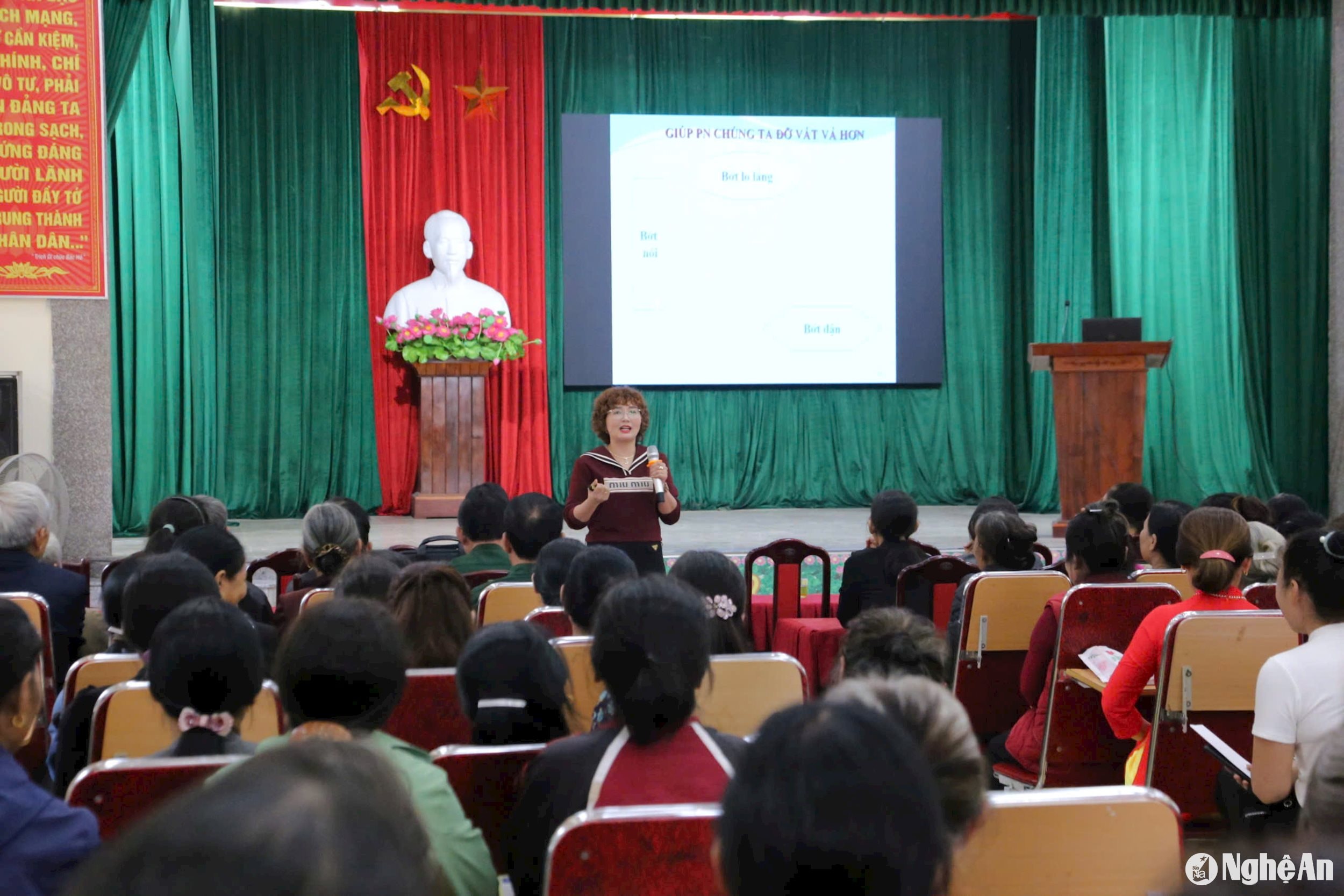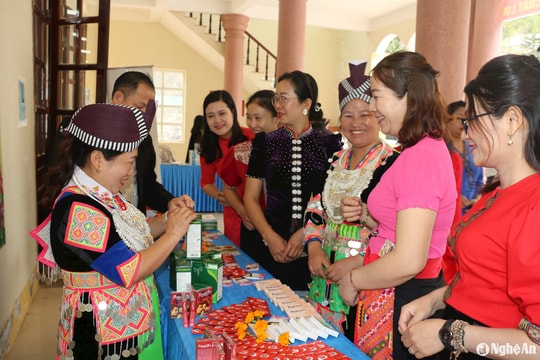Many consequences of gender imbalance at birth
The imbalance in gender ratio at birth is leaving many immediate and long-term consequences. Meanwhile, the practice of choosing gender at birth and prioritizing sons is still happening in many families, making it increasingly difficult to reduce the imbalance in gender ratio at birth.
Worried about having many sons
At the age of over 60, with a wife and children, Mrs. Hoang Thi Lien in hamlet 4, Nam Linh commune, Nam Dan district still has sleepless nights because of worry.
Sharing about this, Ms. Lien said that the family has 3 children and all are married. However, while her husband is an only child, her children have 6 grandchildren, 5 of which are boys. Raising a son compared to a daughter is many times more difficult for her. "My niece is 13 years old this year and she is obedient, thoughtful, and knows how to take care of her grandparents and parents. But boys are definitely more disobedient, the burden of raising boys is also greater because they have to worry about studying, work, and the house, it is really difficult," Ms. Lien shared.

Living in the same neighborhood as Ms. Lien, Ms. Hoang Thi Mai has a different opinion, wanting to have many grandsons to help and take care of the family in the future. However, because her children are all working far away and their lives are not yet stable, she rarely talks about her wishes to reduce the pressure on her children. "Of course, everyone has both boys and girls, and if they want to have 3 or more children, I cannot interfere. But I still tell my children that if they want to have more children, their finances must be stable to avoid the future of not having enough money to pay for their education," Ms. Mai confided.
The propaganda session on gender imbalance at birth recently organized by the Provincial Department of Population and Family Planning in Nam Linh commune attracted a large number of people from the commune to participate.
.jpg)
The special thing is that the target audience for this event is not women of childbearing age but mainly mothers and grandmothers - those who are now grandparents. Although the time for the event was not long, during the talk, the population workers tried to convey a lot of information about gender, gender equality, especially gender equality in the family. On that basis, to help people realize the role of women and eliminate outdated views such as male superiority and female inferiority.
Outdated views are one of the reasons why many families still want to have sons, and do not value or respect daughters. Therefore, we hope that through this conversation, grandmothers and mothers will change their perceptions and thoughts and from there have orientation for their children in the family, avoiding the idea that they must have sons.
Ms. Thai Thi Tuyet - Head of Population Division, Provincial Department of Population and Family Planning
The gender imbalance at birth is evident in many villages today. In Nam Linh commune, out of more than 67 children born in the first 10 months of 2024, 40 were boys and 27 were girls.
Ms. Le Thi Tram - a population officer of the commune said: "Many young couples today use solutions and screening before giving birth to have a son. Therefore, the rate of boys in the commune is increasing day by day. Although we have tried to propagate and mobilize, it is still difficult to change people's awareness. Every family tries to have a son or if they have only one daughter, they must have another child, even if it is the third or fourth child."
Warning of gender imbalance at birth
Gender imbalance at birth has been a concern for many years in Vietnam. In Nghe An, this is a matter of constant concern because the gender imbalance is becoming increasingly serious and is among the provinces with the highest rate of gender imbalance at birth in the country.
In Nam Dan district, in the first 10 months of 2024, the gender imbalance rate at birth was estimated at 117% and many communes were higher than the district average such as Nam Linh, Hong Long, Nam Xuan, Khanh Son. This is also one of the reasons why the third birth rate in the district is still high at more than 21%. Many cases of giving birth to a third child or more are for the purpose of having a son.
Communication about gender imbalance is one of the key tasks of the Nam Dan District Health Department and has to coordinate with related departments and branches. However, the communication is still very difficult because the concept of having a son is "deeply rooted" in the subconscious of the people and in many families.
To raise people's awareness, we identify this as a long-term job that requires "slow and steady wins the race" so that people can gradually see the consequences and not interfere too much in pregnancy and childbirth.
Ms. Le Thi Lai - Head of Population Department, Nam Dan District Medical Center

Across the province, according to reports, in the first three quarters of 2024, the province's third-child birth rate is still high and higher than the same period last year. Besides, the ratiogender imbalanceAt birth, the sex ratio remains high at 116.39 boys/100 girls, while the natural sex ratio at birth is 104 - 106 boys/100 girls.
In addition to Nam Dan district, there are many localities with higher imbalances than the general figures of the province such as Anh Son district with 117.37 males/100 females, Dien Chau district with 119.66 males/100 females, Do Luong district with 133 males/100 females, Que Phong district with 136 males/100 females, Vinh city with 128.77 males/100 females, Thanh Chuong district and Tan Ky district with 119 males/100 females.
These are all alarming numbers and if this situation is not limited, it will lead to many consequences such as in a few decades there will be a situation where men of marriageable age cannot get married due to a lack of women, which can easily lead to an increase in sexual crimes, fraud, kidnapping, trafficking of women; an increase in prostitution, rape of women...
With the current high birth rate and sex ratio at birth, the future population structure will change towards aging and a shortage of men in some age groups...

Together with localities, in recent times, the Provincial Department of Population and Family Planning has actively advised the Provincial People's Committee and the Department of Health to issue directive documents on population work and control of gender imbalance at birth; coordinated with departments, branches and organizations to disseminate the Party's guidelines and the State's policies and laws on population, control of gender imbalance at birth and carry out inspections and checks on compliance with legal regulations on fetal sex determination at public and non-public health facilities.
Talking with Mr. Hoang Dinh Tung - Head of the Provincial Department of Population and Family Planning, he also affirmed that the consequences of gender imbalance at birth have been predicted to be very large. Therefore, to bring the gender ratio at birth back to a natural balance, drastic actions and more efforts from all levels, sectors, localities and each individual and family are needed.
In the coming time, the Provincial Department of Population and Family Planning will continue to propagate and disseminate the Party's guidelines, the State's policies and laws on population work in the new situation. Coordinate with sectors, localities and units to promote the dissemination of the Law on Marriage and Family, the Law on Gender Equality; the current situation of gender imbalance at birth, causes, consequences and solutions.
In addition, we will promote propaganda to enhance the role and position of women and girls; provide life skills education, comprehensive sex education, and focus on gender equality so that girls can live in a safe environment and fully develop physically and mentally...
Mr. Hoang Dinh Tung - Head of the Provincial Department of Population and Family Planning

.jpg)
.jpg)

